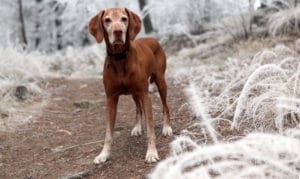The first 2 years of a dog are equal to 10.5 human years. After the first 2 years, every dog year is equal to 4 human years. They grow so fast that we don’t realize that they are getting older every year. Large breed dogs get older more faster than small breeds. Dogs also get grey hair around muzzle and eyes. As they grow older their body also changes just like human beings. Ageing has effect on all body systems and parts. Some changes are faster in some dogs and some changes are slower. As the dog gets older their metabolism slows down. Their dietary requirement for calories also decreases as their activity is also reduced.

Older dogs
Degradation of eyesight and chances to develop glaucoma and cataract is on higher side. Hearing capacity is also reduced. Nails and Hair coat becomes brittle. Skin gets thin, dull and is more prone to bacterial and fungal infections. There is hyperkeratosis (increased keratin) which leads to callus on elbow and foot pads which gets painful when rubbed with hard surfaces. Large breed dogs have tendency to develop arthritis due to changes in vertebral disc. Dashund and basset hound are more prone to this condition. This can cause difficulty in climbing the stairs or car.
Dental diseases are also common in senior dogs. Teeth can degenerate leading to bad breath and odor and in extreme cases it may break or fall off. There is gastrointestinal motility decreases leading to constipation. There is decreased ability to fight against diseases. Decreased heart function and ability to pump blood to other organs. Lungs lose their elasticity there by getting more prone to lung diseases. There is decreased kidney and liver function as well. In spayed senior females, urinary incontinence is very common. Body gets more prone to tumors and cancer. Mammary gland and prostrate are most common glands which are prone to tumors and cancers.
Hypothyroidism, Cushing and diabetes is also very common in aged dogs. Bone marrow is replaced by fat leading to decrease in RBC, WBC and platelets. Decreased activity level, confusion, decreased alertness and disorientation. Decreased immunity leading to more prone to infections and allergies.
Taking care of senior dogs
Lot of care and affection is required by dog that is getting older. They should be regularly groomed along with frequent nail trimming and ear cleaning. Application of petroleum jelly and oils can soften hard foot pads and calluses. Regular 30 minutes walk at least twice a day is most important part of daily routine. Keeping ad-lib fresh water bowls is necessary so they can have water as and when they want. Keep changing water to avoid contamination. Soft bedding should be provided to avoid any injury or pain to pressure points of body. Senior dogs should be well assisted while getting up and down from stairs, couch or cars to avoid further jerk or injury to joints.
Omega-3 fatty acids for older dogs
Omegas can be effective in reducing inflammation, stabiles immune response and thus can be effective to treat arthritis also. Omega 6 helps in optimizes water permeability and omega 3 regulates epidermal proliferation thus helps in maintaining good hair coat and skin. They are also helpful in promoting circulation in various organs. In elderly dogs omegas should be given with lot of care in co relation to existing disease conditions.
Other supplements include calcium, zinc, selenium, Vitamin E, b- complex, vitamin A and biotin which helps in maintaining good condition of eyesight, skin, nerve and joints. Glucosamine and chondroitin sulphate is also very helpful for treatment of arthritis and avoid further deterioration of joints. Various liver supplements can also be provided to improve appetite. Senior dogs undergoing kidney problems should be kept on low potassium diet
FNAC or biopsies can also provide us knowledge about various growths and swelling and what are their tendencies. Your vet can only advice if surgical removal of growth is possible or not or only chemotherapy is feasible.
We can help our companion by getting regular vet visits annual blood checkups, dental check ups,X-rays and ultrasound can help us know our pets body changes better and can give us idea about what should be the best line of treatment to make their life more comfortable and happy.
